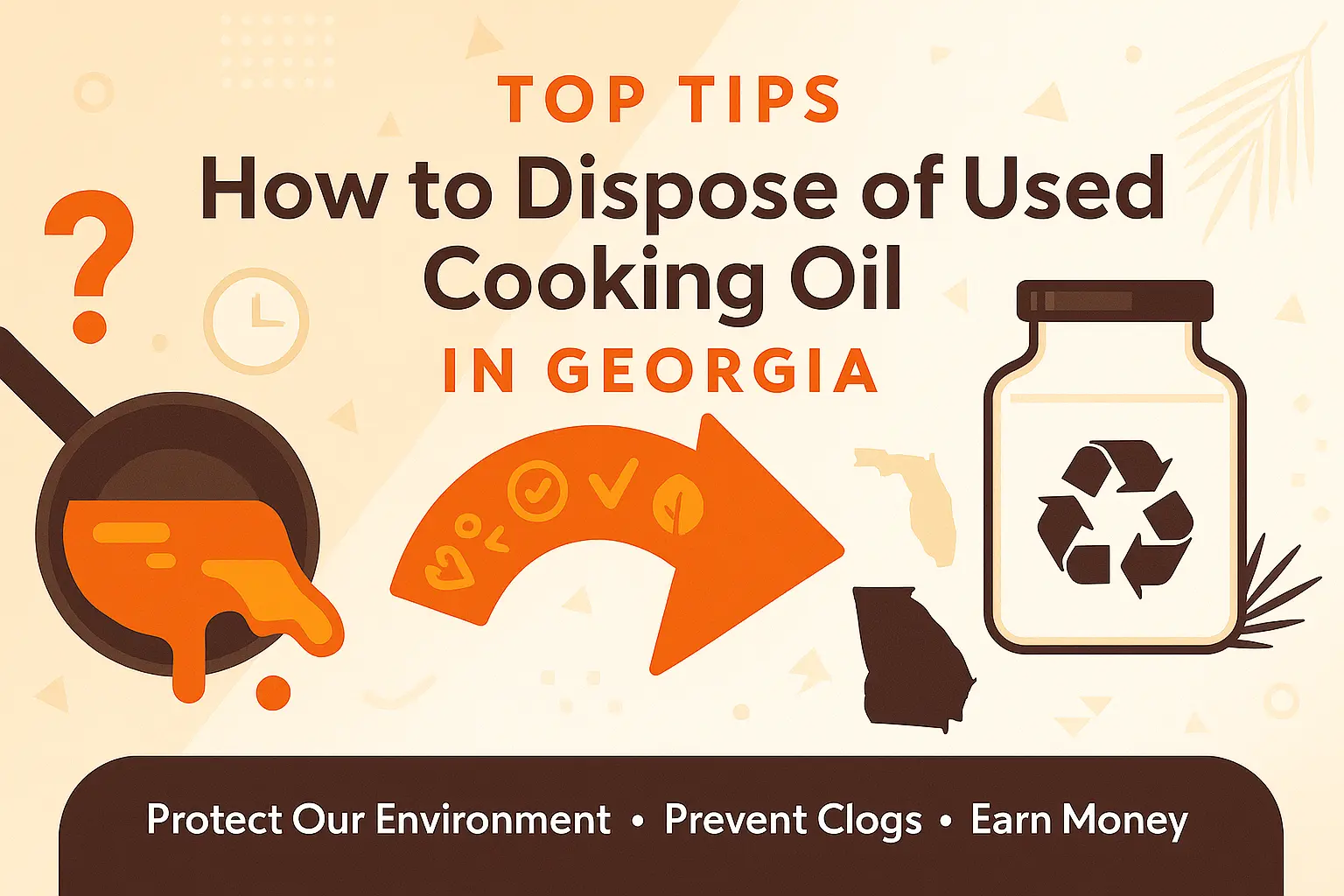Looking to learn how to dispose of cooking oil in Georgia? This guide covers legal and effective methods for both residents and businesses. Knowing the right way to handle used cooking oil prevents plumbing issues and supports environmental sustainability. Read on to learn the best practices and available resources in Georgia.
Key Takeaways
- Improper disposal of cooking oil can cause severe plumbing issues and harm aquatic ecosystems, emphasizing the need for correct disposal practices.
- Georgia provides various recycling services for cooking oil, facilitating its conversion into biodiesel and helping local businesses maintain compliance with environmental regulations.
- Using professional cooking oil recycling services enhances operational efficiency, promotes sustainability, and can improve a business’s reputation in the community.
Importance of Proper Cooking Oil Disposal

Improper disposal of cooking oil can have dire consequences:
- When poured down drains, oil can solidify, causing blockages that damage plumbing and municipal sewer systems.
- These blockages can lead to costly repairs and significant public health concerns if sewage systems fail.
- Cooking oil that enters water sources can harm aquatic life and disrupt local ecosystems.
Improper disposal also attracts pests like rodents and insects, creating sanitation issues for businesses and homes. Businesses that fail to adhere to proper disposal practices can face legal repercussions, including fines and potential litigation. Proper oil recycling helps meet environmental regulations and maintain operational efficiency.
Adhering to proper disposal practices can significantly enhance a business’s reputation. Restaurants that invest in sustainable practices, including proper oil recycling, are often viewed more favorably by the community, which can translate into better customer loyalty and a positive public image. Proper cooking oil disposal and recycling also improve customer satisfaction by ensuring a clean, safe environment and help businesses build trust with environmentally conscious customers.
Community Programs for Cooking Oil Recycling in Georgia
Georgia is committed to promoting sustainability initiatives and protecting public health through a variety of community programs focused on cooking oil recycling. These programs are designed to make it easy and convenient for residents and businesses to recycle used cooking oil, ensuring that waste oil is managed responsibly and kept out of landfills.
Many cities across Georgia, including Atlanta, offer accessible cooking oil recycling services. Residents can take advantage of designated drop-off locations and scheduled collection days, making it simple to dispose of used cooking oil safely. These services often provide clear special instructions and guidelines for proper handling and storage, helping to prevent spills and maintain the quality of recyclable materials. Additionally, residents can recycle used cooking oil for free at these designated locations, making it an easy and cost-effective way to contribute to sustainability.
For those unsure about what materials can be recycled or how to prepare used oil for collection, online resources and waste wizards are available to assist. These tools offer up-to-date information on collection schedules, drop-off sites, and the best practices for recycling cooking oil and other food-related waste.
Commercial kitchens and restaurants in Georgia also benefit from these community programs. By participating in cooking oil recycling, businesses can maintain operational efficiency, reduce waste, and demonstrate their commitment to sustainability. Proper oil recycling not only helps restaurants meet regulatory requirements but also enhances their reputation within the community.
Oversight from the Georgia Department of Public Health and the Environmental Protection Division ensures that all cooking oil recycling services meet high standards for safety, quality, and environmental protection. Residents and businesses are encouraged to contact their local government or waste management authorities to learn more about available services, schedule a collection, or find the nearest drop-off location for their used cooking oil.
By taking part in these community programs, Georgians can play an essential role in reducing environmental impact, supporting public health, and advancing the state’s sustainability goals.
Cooking Oil Recycling Services in Georgia
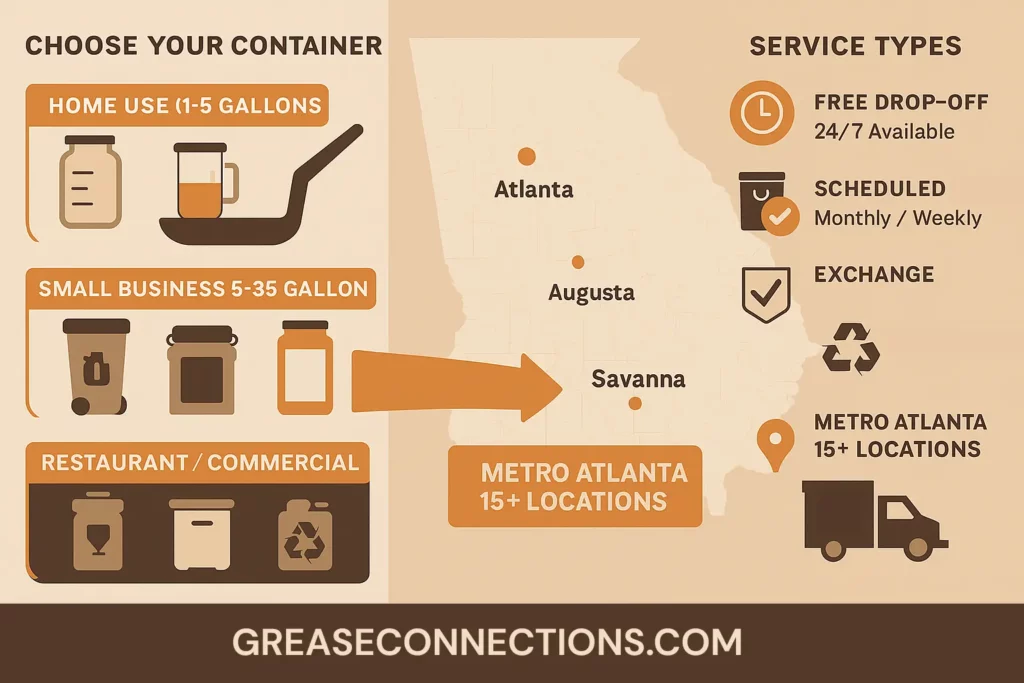
Georgia offers a range of services to help manage and recycle used cooking oil. Companies like Grease Connections s provide collection services in Atlanta GA, repurposing waste oil into biodiesel, a sustainable alternative fuel. This not only helps the environment but also supports local economies by creating jobs and keeping revenue within the community.
Grease Connections offers customized oil management systems that include free oil collection containers tailored to client needs. These systems are designed to address the specific needs of each commercial kitchen, ensuring safety and regulatory compliance. Their integrated system can automate the collection and safe transfer of fryer oil directly from cooking equipment to storage containers, making the process seamless for businesses. Premier Grease also provides professional recycling services, with options specifically designed for commercial kitchens. The oil collected is efficiently processed to ensure sustainability.
Educating the public about the consequences of improper cooking oil disposal is crucial. By partnering with local recycling companies, we can significantly reduce environmental damage and support sustainable practices within our communities to display our commitment to these efforts.
How to Recycle Used Cooking Oil at Home
Recycling used cooking oil at home is simpler than it seems. Follow these steps:
- Store your used oil in a suitable container, such as a metal coffee can or a plastic butter container.
- Label the container to avoid any mix-ups.
- Avoid pouring used cooking oil down the drain because it can solidify and cause severe plumbing issues.
- Cooking oil must be stored in portable or disposable containers before recycling or disposal.
When your container is full, consider the following options for disposing of used cooking oil:
- Check with local waste management services for designated drop-off locations.
- Utilize free recycling programs offered by many communities, especially during the holiday season when cooking activities peak.
- Use curbside recycling programs that may accept used cooking oil, but be sure to place containers at the curb according to local guidelines and make a special collection request if required.
Used cooking oil should never be disposed of with regular garbage, as it can cause environmental and plumbing issues.
Lastly, make sure to include empty bottles of cooking oil in your regular bottles in the recycling efforts at your house. This small step helps promote a more comprehensive recycling habit at home. These practices allow you to contribute to a cleaner environment from home.
Commercial Cooking Oil Management Solutions
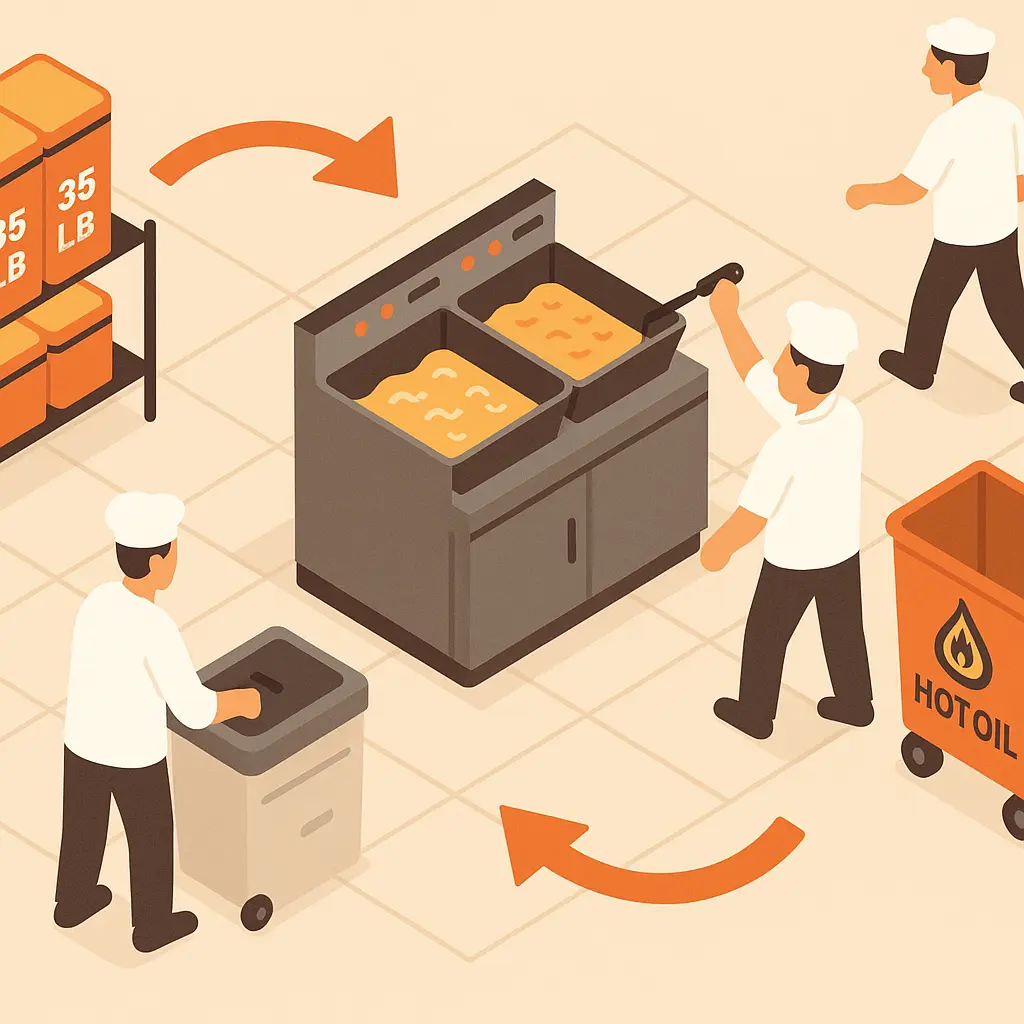
Managing cooking oil effectively is paramount for commercial kitchens. Restaurant Technologies offers an automated cooking oil management system with the following features:
- Eliminates the need for manual handling, significantly improving safety.
- Tracks and analyzes oil usage.
- Helps maintain food quality.
- Reduces waste.
- Using automated systems for handling cooking oil reduces the risk of burns and injuries in commercial kitchens.
- Eliminates the need for manual handling, significantly improving safety.
- Tracks and analyzes oil usage.
- Helps maintain food quality.
- Reduces waste.
Grease traps are essential components in commercial kitchens, as they prevent fats, oils, and grease (FOG) from entering the sewer system. Regular cleaning and maintenance of grease traps are crucial to ensure compliance with local regulations and to avoid costly sewage issues. Grease traps need to be cleaned out regularly to prevent clogging and ensure compliance with local codes.
High-volume operations benefit from a schedule for weekly collection services for used cooking oil on the scheduled collection day in the following ways:
- Ensures efficient management of used cooking oil
- Prevents overflow and potential hazards
- Provides environmental compliance documentation after each collection, assisting restaurants during inspections while collecting used cooking oil.
- Regular cooking oil collection service establishes a reliable schedule tailored to a kitchen’s specific volume and needs.
Grease Connections offers:
- Flexible scheduling options for oil collection, tailored to minimize disruption to business operations.
- Professional services that streamline the recycling process.
- Enhanced kitchen cleanliness.
- Potential reduction in insurance premiums due to improved safety, whether you choose indoor or outdoor collection.
Georgia Regulations for Cooking Oil Disposal
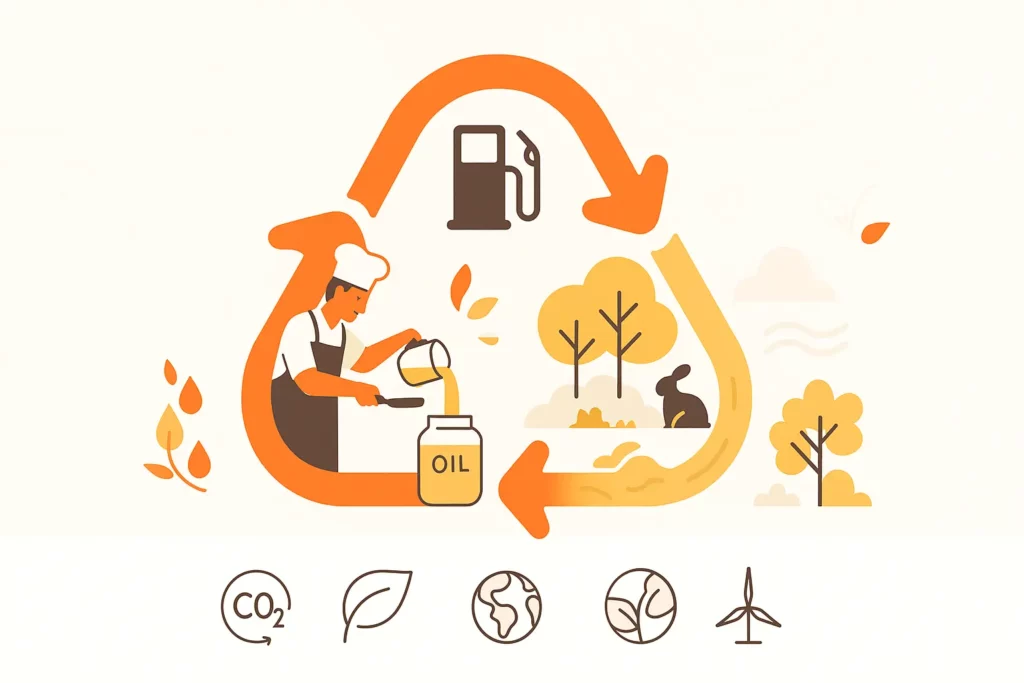
Strict regulations govern cooking oil disposal in Georgia:
- Disposing of cooking oil through standard waste streams or pouring it down drains is illegal.
- Municipalities require documented proof of cooking oil recycling for environmental compliance, including the need to document specific details of each recycling or disposal event, such as date, volume, and service provider.
- Many municipalities require documented proof that restaurants are properly recycling their used cooking oil.
- Businesses must keep accurate records of their disposal practices.
Improper disposal can cause severe plumbing issues, including blockages and damage to municipal sewer systems. These issues can be costly to repair and may result in health code violations and penalties. Utilizing professional recycling services ensures compliance with local regulations and operational efficiency, promoting a smooth flow of waste management.
When recycling options are unavailable, used cooking oil can be sealed in a container and disposed of with regular trash, but only as a last resort. Proper recycling practices prevent environmental pollution and protect our sewer systems.
Benefits of Using Professional Cooking Oil Recycling Services
Professional cooking oil recycling services offer numerous benefits:
- Provide convenience
- Reduce hazards associated with cooking oil management
- Support sustainability initiatives
- Help decrease reliance on foreign oil, enhancing national energy security
- Professional used cooking oil recycling can generate revenue for restaurants through rebate programs.
These services adhere to strict environmental standards and ensure regulatory compliance with the law, providing essential peace of mind for businesses while emphasizing their responsibility in the city. They assist in contributing to the local economy by creating jobs and supporting local companies through transportation. If you wish to learn more, visit our website to alleviate any worry and for additional information.
These services often offer comprehensive customer support to address concerns regarding used cooking oil collection. Companies typically provide a dedicated customer service line for inquiries, ensuring timely contact assistance.
Best Practices for Handling Used Cooking Oil
Handling used cooking oil safely prevents accidents and maintains a clean kitchen environment. Proper handling of used oil involves cooling it in a designated area away from high-traffic zones to prevent burns and spills. Wear personal protective equipment, such as gloves and safety goggles, when dealing with used oil.
To safely store and handle used cooking oil:
- Store used cooking oil in secure containers to prevent leaks or breakage.
- Keep these containers away from heat sources.
- Clearly label the containers to avoid confusion.
- Use proper lifting techniques when moving containers to prevent injuries and ensure proper storage.
Regular maintenance and cleaning of equipment related to used cooking oil prevent hazards like slips and fires. Keep clear pathways in the kitchen and have absorbent materials on hand for spill management.
Environmental Impact of Cooking Oil Recycling
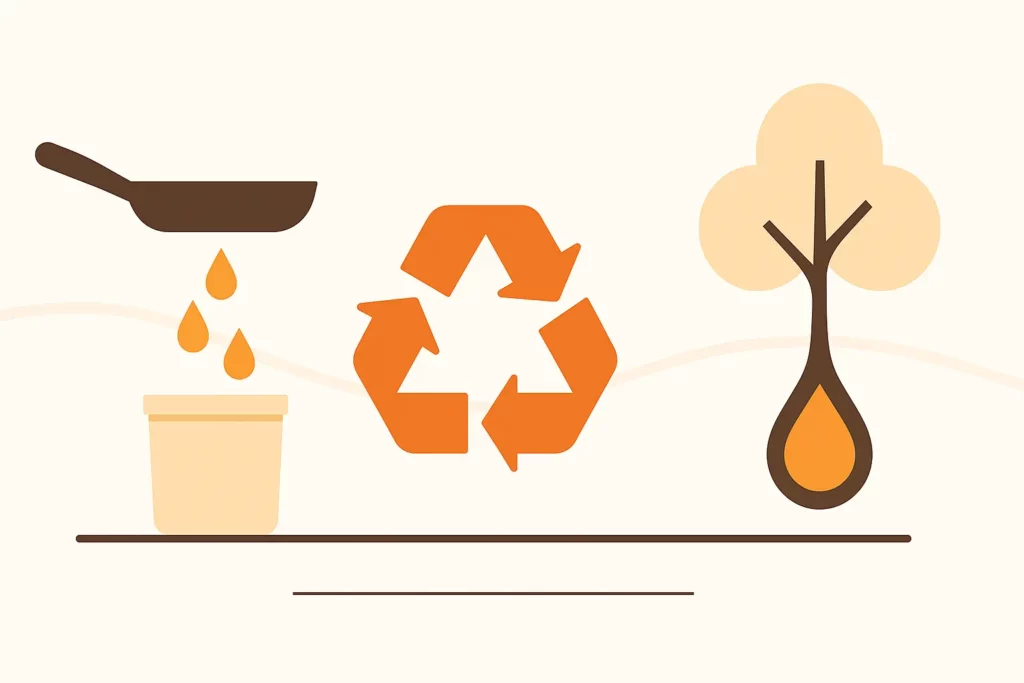
The environmental benefits of cooking oil recycling are considerable:
- Recycling reduces carbon emissions.
- It produces biodiesel, diverting waste from landfills.
- It contributes to renewable energy production.
- Each gallon of biodiesel produced from recycled cooking oil can reduce carbon dioxide emissions by approximately 78%.
Recycling supports environmental sustainability by managing food residuals through composting and other methods. Transforming used cooking oil into renewable fuels helps reduce greenhouse gas emissions by up to 94% through processing.
Contacting Local Recycling Centers
Contacting local recycling centers ensures proper disposal of used cooking oil. In Georgia, find these centers through municipal websites or community resources. Some communities offer drop-off locations for used cooking oil, especially during the holiday season.
Residents can also use the Waste Wizard, a convenient digital tool and app, to quickly find information on recycling and proper disposal of cooking oil and other materials.
To recycle used oil efficiently:
- Check local waste management services for special instructions and scheduled collection days.
- Review detailed guidelines provided by many centers on how to prepare your used oil for drop off this item.
- Confirm what types of containers are acceptable for used oil recycling.
By following these instructions and utilizing available resources, contribute to a more sustainable community. Properly recycling used cooking oil protects the environment and supports local recycling efforts.
Summary
In conclusion, proper disposal and recycling of cooking oil are essential for environmental sustainability, public health, and compliance with legal regulations. From home recycling practices to advanced commercial solutions, there are numerous ways to manage used cooking oil responsibly. By utilizing professional services, adhering to best practices, and staying informed about local regulations, we can all contribute to a cleaner, safer community.
Frequently Asked Questions
Why is it important to dispose of cooking oil properly?
It is essential to dispose of cooking oil properly to prevent environmental harm, pest attraction, and potential legal consequences. Proper disposal protects your community and ecosystem.
What are some recycling services available in Georgia?
In Georgia, Clean Energy Biofuels and Southern Green Industries provide collection and recycling services for various materials. Engaging with these companies can contribute significantly to sustainable waste management practices. Additionally, Mahoney Environmental offers used cooking oil pickup and recycling services in Atlanta, GA, providing another reliable option for businesses and residents.
Can I recycle used cooking oil at home?
Yes, you can recycle used cooking oil by storing it in a suitable container and taking it to designated recycling locations. This helps protect the environment and promotes sustainability.
What are the benefits of using professional recycling services?
Using professional recycling services enhances safety, ensures compliance with regulations, and contributes to the support of local economies. Such services maximize recycling efficiency and environmental responsibility.
How does recycling cooking oil impact the environment?
Recycling cooking oil significantly benefits the environment by reducing carbon emissions, generating biodiesel, and preventing damage to sewer systems. This practice promotes sustainability and supports cleaner ecosystems.
Start Earning Today
Phone
Address
2217 N.W 7st, Miami, FL 33125
Hours of Operation
Mon – Sunday – 24/7

